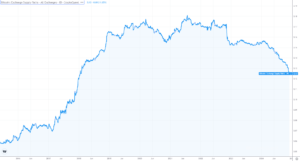SEC Charges ‘ICO Superstore,’ Digital Hedge Fund Manager with Registration Failures
Photo by Morgane Elvira on Unsplash
The U.S. Securities and Exchange Commission is charging two crypto-related entities with registration failures, in what it considers a first for both enforcement actions.
TokenLot Hit with Unregistered Broker-Dealers

The first to be hit with charges is Michigan-based TokenLot, a self-described “ICO Superstore,” and its owners–Lenny Kugel and Eli Lewitt.
According to the SEC, this is its first case of charging unregistered broker-dealers for selling digital tokens after issuing The DAO Report in 2017. TokenLot primarily operated between July 2017 and February 2018, with most of its business occurring after the report was distributed.
As per the SEC charges, TokenLot, Kugel and Lewitt promoted the TokenLot website as a method of purchasing digital tokens during ICOs, as well as a way to engage in secondary trading. During this period, TokenLot handled more than 200 different tokens, which the SEC found included securities, and received orders from over 6,100 retail investors.
TokenLot, Kugel and Lewitt were also charged with violating registration provisions in connection with their behavior.
While the culprits did not admit or deny the SEC’s findings, they did consent to the SEC’s order and paid $471,000 in disgorgement as well as $7,929 in interest. They will also retain an independent third party to destroy TokenLot’s remaining digital asset inventory.
Kugel and Lewitt, meanwhile, also agreed to pay penalties of $45,000 each as well as agreed to an investment company prohibition with the right to reapply after three years.
Steven Peikin, co-director of the SEC’s Enforcement Division, said:
“The penalties in this case reflect the prompt cooperation and remedial actions by TokenLot, Kugel and Lewitt. TokenLot, Kugel and Lewitt provided valuable information to Commission staff, stopped the conduct and refunded money to investors.”
Stephanie Avakian, co-director of the SEC’s Enforcement Division, added:
“U.S. securities laws protect investors by subjecting broker-dealers and other gatekeepers to SEC oversight, including those offering ICOs and secondary trading in digital tokens. We continue to encourage those developing digital asset trading businesses to contact the SEC staff at [email protected] for assistance in analyzing registration and other securities requirements.”
Crypto Asset Management to Pay $200,000 Penalty
Next to face SEC charges is California-based Crypto Asset Management (CAM), which offered a fund operating as an unregistered investment company and marketed itself as the “first regulated crypto asset fund in the U.S.”
According to the SEC, this is its first case concerning an investment company violation by a hedge fund manager based on its investments in digital assets.

Per the SEC’s findings, CAM and its sole principal, Timothy Enneking, secured over $3.6 million during a four-month period in 2017, all while claiming to have filed a registration with the agency and that it was regulated. After investing more than 40 percent of the fund’s assets in digital asset securities, CAM essentially caused the fund to operate as an unregistered investment company.
CAM and Enneking have agreed to the SEC’s order, without admitting to or denying the findings, and will pay a penalty of $200,000. The entity has also ceased its public offering and offered buybacks to investors.
Dabney O’Riordan, co-chief of the SEC’s Asset Management Unit, noted:
“Hedge funds seeking to ride the digital asset wave continue to proliferate. Investment advisers must be sure that the funds they offer adhere to the applicable registrations obligations and must accurately represent their funds’ regulatory status to investors.”




 Farside Investors
Farside Investors 


 CryptoQuant
CryptoQuant 
 CoinGlass
CoinGlass 















































































